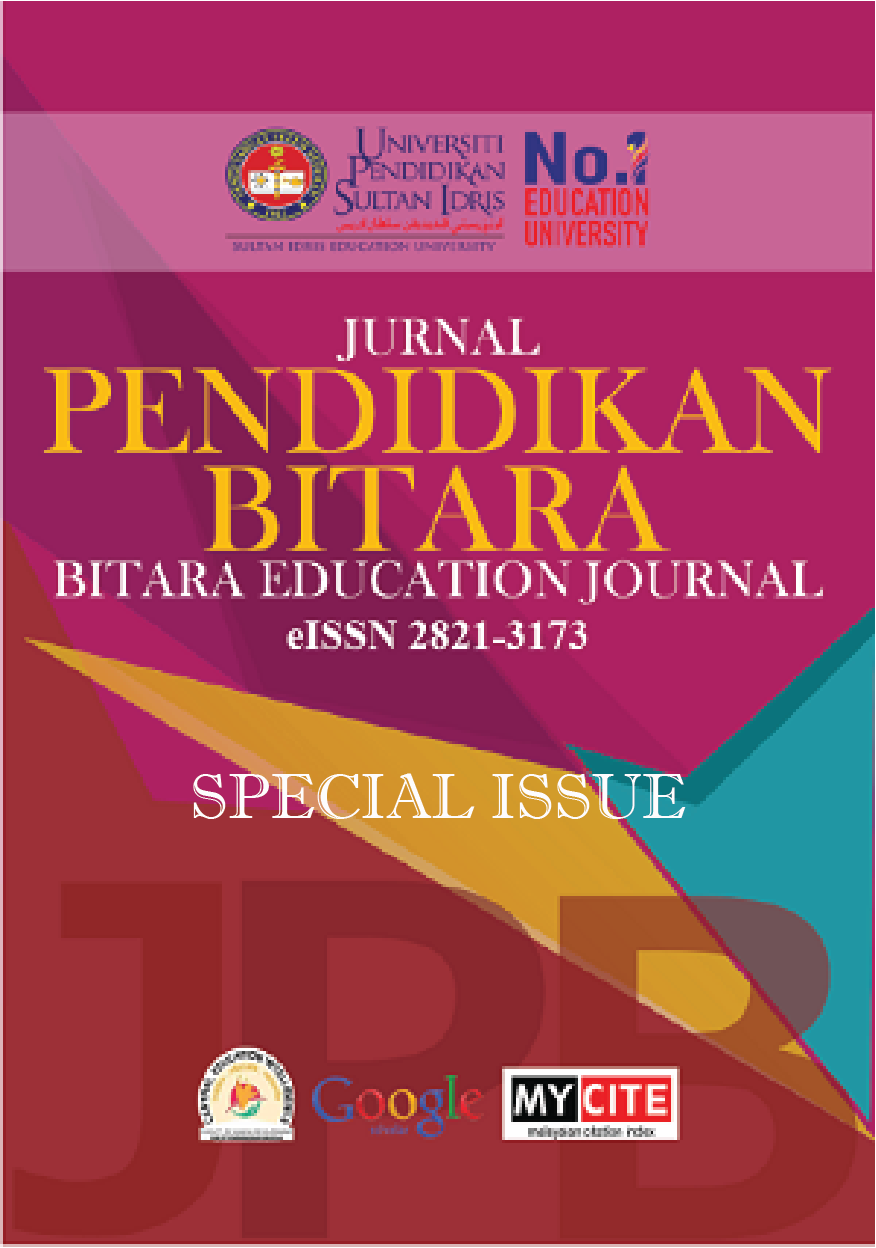Experience of Students in Problem-Based Learning for Science in A Sabah Secondary School: Preliminary Finding for A Case Study
DOI:
https://doi.org/10.37134/bitara.vol16.sp2.10.2023Keywords:
Problem-Based Learning (PBL), 21st Century Skills (21CS), Cognitive, Intrapersonal, Interpersonal DomainsAbstract
Problem-based learning (PBL) is an alternative to conventional teaching methods for students to learn through real-world issues. The study aims to explore the PBL approach (as suggested in Malaysia Education Blueprint 2013-2025), which is students centered and has been employed in real-life settings. From the literature, students who learn through PBL possess the characteristics of self-directed and self-regulated learners who can collaborate and cooperate in learning. The background is contextual, which promotes students' motivation. As a result, students acquired 21st-century skills (21CS) consisting of cognitive, intrapersonal, and interpersonal domains. The author is interested in exploring the process of PBL via the Water Vision Program and the characteristics of students who learned through the PBL process. A qualitative case study was conducted using semi-structured interviews. The participants were a teacher as facilitator and two students who were involved with the Water Vision Program. The data underwent thematic analysis, and three main themes emerged: the learning process through PBL, challenges, and student development.
Downloads
References
Al Sultan, A., Henson, H. J., & Lickteig, D. (2021). Assessing preservice elementary teachers’ conceptual understanding of scientific literacy. Teaching and Teacher Education, 102, Article 103327. https://doi.org/10.1016/j.tate.2021.103327
Aslan, A. (2021). Problem-based learning in live online classes: Learning achievement, problem-solving skill, communication skill, and interaction. Computers & Education. 171, Article 104237. https://doi.org/10.1016/j.compedu.2021.104237
Bahagian Pembangunan Kurikulum. (2019). DSKP KSSM SCIENCE FORM 4 AND 5. Putrajaya: Kementerian Pendidikan Malaysia.
Chen, C. M., & Kuo, C. H. (2019). An optimized group formation scheme to promote collaborative problem-based learning. Computers & Education. 133, 94-115.
Creswell, J. W. (2013). Qualitative inquiry & research design: Choosing among five approaches. (3rd ed.). SAGE Publications, Inc.
Haug, B. S., & Mork, S. M. (2021). Taking 21st century skills from vision to classroom: What teachers highlight as supportive professional development in the light of new demands from educational reforms. Teaching and Teacher Education. 100, Article 103286. https://doi.org/10.1016/j.tate.2021.103286
Kwan, C. Y. (2019). A thorny path: the developmental course of problem-based learning for health sciences education in Asia. Advances in Health Sciences Education. 24, 893-901.
Lonergan, R., Cumming, T. M., & O’Neill, S. C. 2022. Exploring the efficacy of problem-based learning in diverse secondary school classrooms: Characteristics and goals of problem-based learning. International Journal of Educational Research. 112, Article 101945. https://doi.org/10.1016/j.ijer.2022.101945
Malaysian Natural Society. (n.d.). MNS & Coca-Cola Water Vision Programme. Retrieved July 3, 2023, from https://www.mns.my/mns-coca-cola-water-vision-programme-2/
Maxwell, J. A. (2013). Qualitative research design: an interactive approach. (3rd ed.). SAGE Publications, Inc.
McPhail, G. (2020). Twenty-First Century Learning and the Case for More Knowledge About Knowledge. New Zealand Journal of Educational Studies. 55, 387-404. https://doi.org/10.1007/s40841-020-00172-2
Merriam, S. B. (2009). Qualitative research: a guide to design and implementation. John Wiley & Sons, Inc.
Montepara, C. A., Woods, A. G., & Wolfgang, K. W. (2021). Problem-based learning case studies: Delivery of an educational method and perceptions at two schools of pharmacy in Italy. Currents in Pharmacy Teaching and Learning. 13(6), 171-722. http://dx.doi.org/10.1016/j.cptl.2021.01.026
Sebatana, M. J., & Dudu, W. T. (2021). Reality or Mirage: Enhancing 21st-Century Skills Through Problem-Based Learning While Teaching Particulate Nature of Matter. International Journal of Science and Mathematics Education. 20, 963–980. https://doi.org/10.1007/s10763-021-10206-w
Seibert, S. A. (2021). Problem-based learning: A strategy to foster generation Z's critical thinking and perseverance. Teaching and Learning in Nursing. 16(1), 85-88.
Stake, R. E. (1995). The art of case study. SAGE Publications, Inc.
Teo, P. (2019). Teaching for the 21st century: A case for dialogic pedagogy. Learning, Culture and Social Interaction, 21, 170-178.
Trna, J., & Trnova, E. (2015). The current paradigms of science education and their expected impact on curriculum. Procedia - Social and Behavioral Sciences. 197, 271-277.
Webb, M. E., Prasse, D., P hillips, M., Kadijevich, D. M., Angeli, C., Strijker, A., Carvalho, A. A., Andresen, B. B., Dobozy, E., & Laugesen, H. (2018). Challenges for IT-Enabled Formative Assessment of Complex 21st Century Skills. Technology, Knowledge and Learning. 23, 441-456. https://doi.org/10.1007/s10758-018-9379-7
Wilson, C. (2014). Interview techniques for UX practitioners, a user-centered design method. Elsevier Inc.
Wright, E., & Lee, M. (2014). Developing skills for youth in the 21st century: The role of elite International Baccalaureate Diploma Programme schools in China. International Review of Education. 60, 199-216.
Yew, E. H. J., & Goh, K. (2016). Problem-based learning: an overview of its process and impact on learning. Health Professions Education, 2(2), 75-79.
Yin, R. K. (2011). Qualitative research from start to finish. Guilford Publication, Inc.
Yorkovsky, Y., & Levenberg, I. (2021). Characteristics of candidates wishing to study science and mathematics toward a teaching certificate. Teaching and Teacher Education. 101, Article 103282. https://doi.org/10.1016/j.tate.2021.103282
Downloads
Published
How to Cite
Issue
Section
License
Copyright (c) 2023 Kian Hua Lai, Mohd. Zaki Ishak, Christina Peter Ligadu

This work is licensed under a Creative Commons Attribution-NonCommercial-ShareAlike 4.0 International License.





